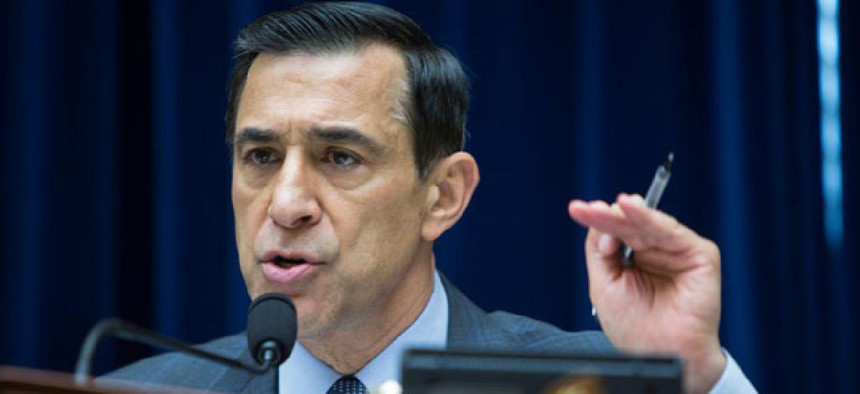IT Reform Act Could Hitch a Ride on Major Defense Bill

Rep. Darrell Issa, R-Calif. House subcommittee on Oversight and Reform
Sponsors will offer the overhaul as an amendment to the Defense Authorization Act.
The bipartisan team sponsoring a complete reboot of how the government buys information technology introduced a version of its bill as an amendment to the National Defense Authorization Act on Tuesday.
Packaging separate legislation inside a major policy bill such as the Defense Authorization Act can speed passage because lawmakers are wary of jeopardizing the full bill based on opposition to a minor part.
The House Rules Committee will consider amendments to the defense bill during a meeting on Wednesday afternoon.
The Federal Information Technology Acquisition Reform Act won approval from the House Oversight and Government Reform Committee in March and is awaiting action on the House floor. The bill was sponsored by Committee Chairman Rep. Darrell Issa, R-Calif., and Rep. Gerry Connolly, D-Va., ranking member of the committee’s government operations panel.
“Chairman Issa is pursuing all channels to advance his IT reform legislation,” a committee spokesman said by email Tuesday. He also noted that the 1996 Clinger-Cohen Act, which established the modern system of agency chief information officers, was also advanced as an amendment to the annual Defense authorization bill.
The government spends about $80 billion on IT annually, at least $10 billion of which auditors say is either lost to waste, duplication and inefficiency or could be saved by transitioning to more modern systems that would better serve federal employees and taxpayers.
The reform act would give CIOs authority over all IT spending inside their agencies and create a collection of agency-based Assisted Acquisition Centers of Excellence that other agencies may consult regarding particular categories of IT purchases, among other reforms.
The defense bill version of the reform act was updated based on public and industry feedback, including comments on the social legislating platform Madison managed by the Open Gov Foundation and hosted by Nextgov.
Among the most significant changes, the updated act specifies that a Federal Infrastructure and Common Application Collaboration Center, designed to serve as a “tiger team” to assist agencies with tricky acquisitions, will be located inside the Office of Management and Budget’s E-Government Office and will report to the federal CIO. The collaboration center had previously been placed inside OMB but not within a specific office.
The amendment version also further de-emphasizes a mandate that agencies consider open source alternatives when making major technology purchases. Industry groups, including TechAmerica, objected that those mandates could be read to favor some vendors over others. Issa’s office maintained it was only urging agencies to consider all options.
The updated bill also specifies that mandates to increase transparency reporting on the Federal IT Dashboard should apply to spending on ongoing IT maintenance, not just new projects. About 70 percent of the government’s annual IT spending goes to operations and maintenance of existing IT systems, according to the Government Accountability Office.
Federal CIO Steven VanRoekel has told Congress he does not believe new legislation is necessary to make government IT spending more efficient. He told members of the Senate Homeland Security and Governmental Affairs Committee on Tuesday that giving agency CIOs budget authority is less important than offering them a “seat at the table” when major spending decisions are made.
David Powner, director of Information Technology Management Issues at GAO, told committee members agency CIOs may not need authority over all IT spending but that giving CIOs authority over commodity IT spending such as Internet and cellphone service is “a no brainer.”
The IT reform act also would:
- Promote broader use of “bid to price” contracts in which an agency states the price it plans to pay for a good or service and then invites vendors to compete based on quality;
- Broaden the government’s cadre of IT and acquisition experts;
- Give agency CIOs flexibility to establish working capital funds to help pay for the transition to cloud-based computing services;
- Require agencies to report more fully on the cost savings achieved by consolidating federal data centers.






